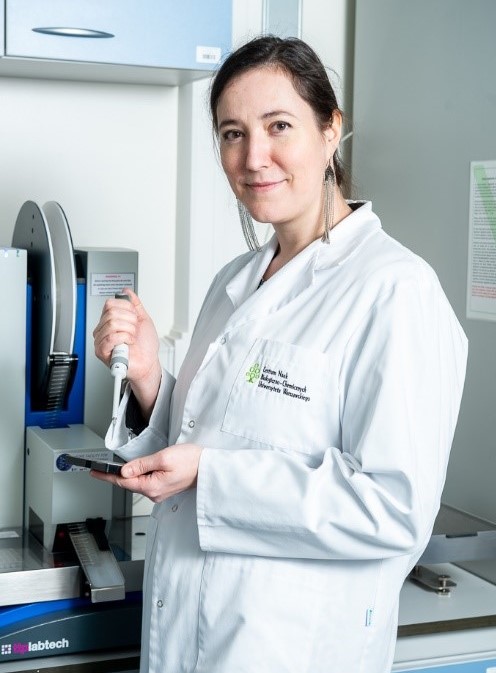Alumni

Meet Maria Gorna
1. Tell me in 5 words who is Maria Gorna?
Science addict / Creative / Bubbly / Compassionate / Short memory.
2. What made you join CeMM?
I had an opportunity to attend Sci Foo where I met Giulio. He charmed me with his passion and vision while I was already interested in his research (years prior I had cited his papers for my bachelor thesis on protein networks). I wanted to join a vibrant place where I could learn about medically relevant topics, and Vienna is a great place too, so everything sounded like an excellent fit.
3. What is it about science that interests you the most?
I like finding out interesting facts and connecting them together into a bigger picture. I really enjoy problem solving and thinking of all possible interpretations and solutions. My biggest problem is that I always have more ideas than hands and time to test them, but I like feeling that there is so much to discover. I am one of the people who very much enjoy writing grant proposals and thinking up new projects.
4. What is the best career advise you ever received, or you can give to the CeMM community?
Do not close any doors – for example, even if you think you might not want to be a PI, this might change in the future, so don’t narrow your choices too early. On a similar note, open up yourself to new challenges – instead of rejecting a proposal, think about under what conditions you would like to do it instead.
5. Tell us what happened to you after you left CeMM?
I was recruited by a former professor to return to my alma mater at the University of Warsaw. The aim was to help them set up a protein crystallography laboratory at the Department of Chemistry, and I had broad structural biology experience from my PhD. I started applying for grants in my last year at CeMM and was successful with about one third of my proposals, which I took as a good sign that my research ideas were legit. This is how I started my Structural Biology Group (or “Go!RNA lab”). My times at CeMM have “spoiled” me though and I couldn’t imagine doing just structural biology anymore, so we pursue an excessive variety of topics: RNA metabolism, innate immunity, bacterial degraders, a couple of patent applications from applied projects, commercial services, and even part-timing at/incubating a biotech start-up. At first it took us quite some time to launch the laboratory due to delays with the opening of our new building, but we finally got it running smoothly a year before the pandemic – tough luck! We’re getting back on our feet at the moment.
6. What book do you have on your night table at the moment?
I have just started on “Autonomous” by Annalee Newitz. I’m an avid science-fiction and fantasy fan, and this one seemed to have some fun ideas – the heroine is a pharmaceutical pirate running the print-your-own-drug free medicine underground of the future.
7. What is the last song you heard?
Cu Cu Ru Cu Cu Paloma sang by Harry Belafonte. I made a Spanish language playlist to enjoy on a lazy summer day during my holidays in Spain.
8. Any message you would like to give to the CeMMies or a former colleague?
So much of doing science is about people you’re doing it with. I enjoyed my time at CeMM very much and I miss you all – I hope you are having fun in science or other exciting endeavors! Remember to visit me in Warsaw when you drop by.
Maria (called Maja by her friends) studied biotechnology and theoretical chemistry at the University of Warsaw, and did her PhD in biochemistry and structural biology with Ben Luisi at the University of Cambridge. She joined CeMM as a postdoc in 2010 in the group of Giulio Superti-Furga, which opened her eyes to a whole new world of translational science, from leukemia to innate immunity. Her excitement for science pushed her to return to University of Warsaw in 2015 to try her own ideas as a PI in molecular and structural biology. While this lasts, she enjoys very much running research projects and engaging in research community building (she was on the Board of the Marie Curie Alumni Association). These days, when mRNA vaccines save so many lives, she thinks the name of her lab - Go!RNA – is especially apt ;).
